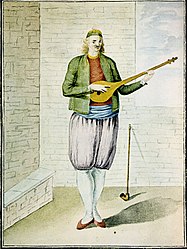 Greek playing tambouras, 18th-century painting Greek playing tambouras, 18th-century painting | |
| String | |
|---|---|
| Classification | Plucked |
| Related instruments | |
The tambouras (Greek: ταμπουράς [tabuˈras]) is a Greek traditional string instrument of Byzantine origin. It has existed since at least the 10th century, when it was known in Assyria and Egypt. At that time, it might have had between two and six strings, but Arabs adopted it, and called it a tanbur. The characteristic long neck bears two strings, tuned five notes apart.
It is also similar to the Turkish tambur and Indian tanpura.
Tanbur, a Persian word, is according to some scholars derived from the Sumerian pan tur, meaning "little bow".
History
Origins
See also: Lute § History and evolution of the luteIt is considered that the tambouras' ancestor is the ancient Greek pandouris, also known as pandoura, pandouros or pandourida (πανδουρίς, πανδούρα, πάνδουρος), from which the word is derived. The tambouras is mentioned in the Byzantine epic of Digenis Akritas, when the hero plays his θαμπούριν, thambourin (medieval form of tambouras):
Και αφότου αποδείπνησεν, εμπαίνει εις το κουβούκλιν
και επήρεν το θαμπούριν του και αποκατάστησέν το.
When he had finished his meal, he entered his chamber
and picked up his tamboura and tuned it.
— Digenis Akritis, Escorial version, vv. 826–827, ed. and transl. Elizabeth Jeffreys
Name
The name resembles that of the Indian tanpura, but the Greek tambouras is a completely different instrument. Since modern Greek words do not have a standard transliteration into the Latin alphabet, the word may be found written in many ways: tampouras, tambouras, tabouras, taburas etc. Even the final -s may be dropped at the transliteration, since it marks the masculine nominative in Greek. Variations of the word are to be found in Greece: tsambouras, tambouri.
The word ταμπουράς comes from Turkish tambur from Arabic ṭanbūr or Persian tunbūra.
Type
The tambouras is a long-neck fretted instrument of the lute family, close to Turkish saz and the Persian tanbur. It has movable frets that permit playing tunes in the Greek traditional modes (equivalent of the makams of Arabic music and the ichoi of Byzantine music). It was also known as Pandouris, Pandoura and Fandouros in the Byzantine Empire. When the tambouras was tempered, it gave rise to the bouzouki, which is, in fact, a recent development of the tambouras.
Gallery
-
 Display of Greek tamboura at the right (the inst. left is a tambur).
Display of Greek tamboura at the right (the inst. left is a tambur).
-
See also
References
Notes
- ^ Eleni Kallimopoulou (2009), Paradosiaká: Music, Meaning and Identity in Modern Greece, SOAS musicology series, Ashgate Publishing, pp. 50 & 53, ISBN 978-0-7546-6630-1
- ^ "Traditional Stringed Instruments of Greece". Retrieved 2010-03-28.
- "The Stringed Instrument Database: Index". stringedinstrumentdatabase.aornis.com. Retrieved 2023-03-29.
- "Combined Search". greek-language.gr. Retrieved 2023-03-29.
- "tamboura: definition of tamboura in Oxford dictionary (American English)". 2013-12-16. Archived from the original on 2013-12-16. Retrieved 2023-03-29.
- John Shepherd (2003), "Performance and Production", Continuum, Continuum Encyclopedia of Popular Music of the World: Volume II: Performance and Production, vol. 11, p. 68, ISBN 978-0-8264-6322-7, retrieved 2010-03-16
Sources
- Anogeianakis, Foivos. Ellinika Laika Mousika Organa. Athens: Melissa, 1991 (2nd Edition).
- Grapsas, Nikos. Tambouras. Methodos Didaskalias. Athens: Nikolaidis, 2007.
- Jeffreys, Elizabeth. Digenis Akritis. The Grottaferrata and Escorial Versions. Cambridge: Cambridge University Press, 1998.
| Greek musical instruments | |||||||||||||||||
|---|---|---|---|---|---|---|---|---|---|---|---|---|---|---|---|---|---|
| Ancient |
| ||||||||||||||||
| Medieval | |||||||||||||||||
| Modern |
| ||||||||||||||||
| See also | |||||||||||||||||
